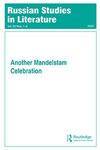曼德尔施塔姆的《斯大林颂》——在1937年歌颂斯大林的诗坛中
4区 文学
Q4 Arts and Humanities
引用次数: 0
摘要
Oleg a . Lekmanov提供了大量1930年代,特别是1937年的关于斯大林的诗歌,这些诗歌的作者包括著名的和被遗忘的俄语苏联诗人,以及来自苏联各个民族的诗人,其中包括被认为是民间传说的例子,被翻译成俄语。曼德尔施塔姆在他的《斯大林颂》中运用了这些熟悉的、被接受的词汇,列克马诺夫认为,1937年的读者会确切地知道如何阅读每一个比喻——尽管曼德尔施塔姆经常颠覆它们,或者给它们带来意想不到的生活。在文章末尾呈现的“颂歌”,在对其他诗人的预备阅读之后,确实读起来有所不同。本文章由计算机程序翻译,如有差异,请以英文原文为准。
Mandelstam’s Stalin Ode Within the Context of the Overall Poetic Glorification of Stalin in 1937
Oleg A. Lekmanov provides copious examples of poems about Stalin from the 1930s, and especially 1937, written by a wide range of both famous and forgotten Russophone Soviet poets as well as poets from various Soviet nationalities, including examples of putative folklore, translated into Russian. Mandelstam mobilizes this familiar and accepted vocabulary in his Stalin Ode, and Lekmanov argues that a reader in 1937 would have known exactly how to read each trope—although Mandelstam nonetheless frequently subverts them or brings them to unexpected life. The “Ode,” presented towards the end of the article, does indeed read differently after preparatory reading of the other poets.
求助全文
通过发布文献求助,成功后即可免费获取论文全文。
去求助
来源期刊

RUSSIAN STUDIES IN LITERATURE
LITERATURE, SLAVIC-
自引率
0.00%
发文量
0
期刊介绍:
Russian Studies in Literature publishes high-quality, annotated translations of Russian literary criticism and scholarship on contemporary works and popular cultural topics as well as the classics. Selections are drawn from the leading literary periodicals including Literaturnaia gazeta (Literary Gazette), Novoe literaturnoe obozrenie (New Literary Review), Oktiabr (October), Voprosy literatury (Problems of Literature), and Znamia (Banner). An editorial introduction to every issue provides context and insight that will be helpful for English-language readers.
 求助内容:
求助内容: 应助结果提醒方式:
应助结果提醒方式:


